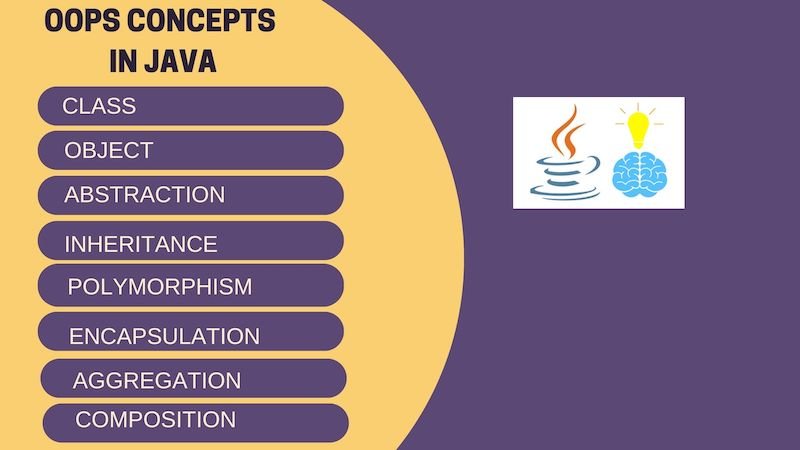In this article, we will learn about OOPs concepts in Java. So, let’s get started.

Core OOPS concepts in Java
We have the following Core OOPs concepts in Java.
Object: An object is a fundamental unit in OOPS. It represents a real-world entity with its attributes (data) and behaviors (methods). Objects are instances of classes and can interact with each other through method calls and data sharing.
Class: A class is a blueprint or template for creating objects. It defines the attributes and methods that the objects will have. In other words, a class is a user-defined data type that encapsulates data and methods.
Read More : Classes and Objects in Java
Abstraction: Abstraction involves hiding complex implementation details and showing only the essential features of an object. It allows you to focus on the high-level functionality of an object without worrying about the internal details.
Read More : Abstraction in Java: Full Exploration
Inheritance: Inheritance allows a new class (subclass/derived class) to inherit properties and behaviors from an existing class (superclass/base class). It promotes code reusability and the creation of a hierarchy of related classes.
Read More : Inheritance in Java: Great Insights
Polymorphism: Polymorphism means “many forms.” It allows objects of different classes to be treated as objects of a common superclass through method overriding and method overloading. This concept enables flexibility and extensibility in your code.
Read More : Polymorphism in Java:Unleashing Flexibility and Reusability
Encapsulation: Encapsulation is the bundling of data (attributes) and methods (functions) that operate on the data into a single unit (class). It provides data hiding and ensures that the internal state of an object is accessed and modified only through controlled methods.
Read More : Encapsulation in Java: In-Depth Exploration
Aggregation: Aggregation is a type of relationship between classes where one class (the whole) contains or is composed of another class (the part). It represents a “has-a” relationship. The part can exist independently of the whole.
Composition: Composition is a stronger form of aggregation, where the lifetime of the whole is tightly linked to the lifetime of its parts. If the whole is destroyed, its parts are also destroyed. It represents a more intimate “contains-a” relationship.
Read More : Inheritance vs Composition vs Aggregation
Conclusion : OOPs Concepts in Java
In this article, we’ve covered the core OOPs concepts in Java. These concepts—Object, Class, Abstraction, Inheritance, Polymorphism, Encapsulation, Aggregation, and Composition—form the foundation of Java programming. By mastering these concepts, developers can create structured, reusable, and flexible code for building robust software solutions.
